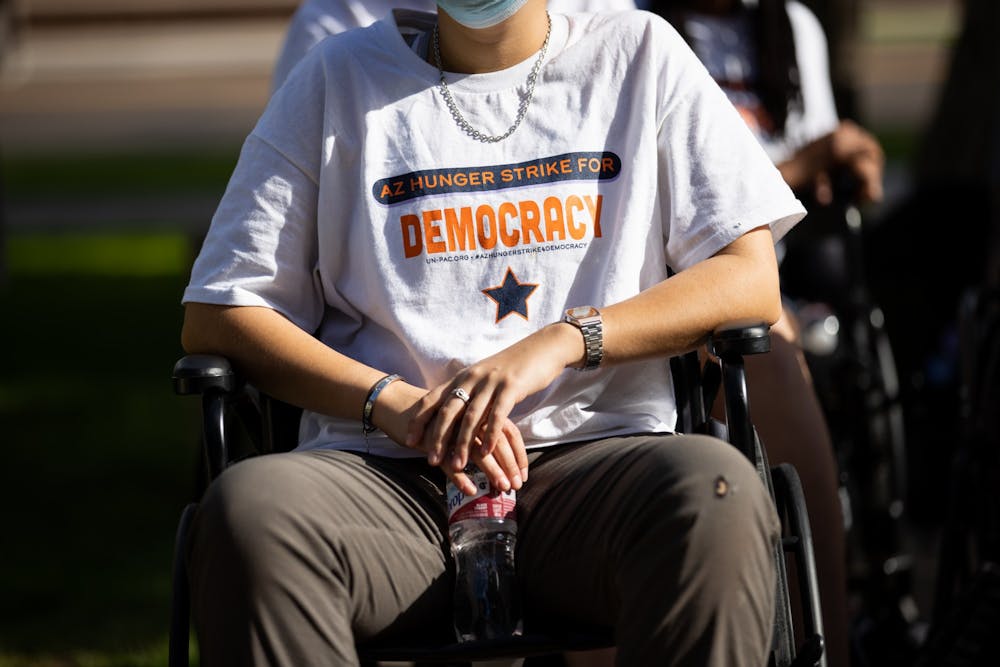Around a dozen ASU students are among the over 40 students in an indefinite hunger strike in Washington, D.C., to push for the passage of the Freedom To Vote Act and the John Lewis Voting Rights Advancement Act.
On Jan. 13, the students joined 25 faith leaders in the strike. The faith leaders had already been striking for seven days when they joined.
The AZ Youth Hunger Strike for Democracy began for these students on Dec. 6 at the Arizona State Capitol, before they traveled to Washington. The original strike lasted 15 days. The group is part of the nationwide Un-PAC, a non-partisan group working to reduce the role of money in politics. The group also has a campus presence through Un-PAC @ ASU.
The Freedom To Vote Act aims to protect elections from voter suppression, gerrymandering and dark money. It also aims to make election day a national holiday and allow automatic and same-day voter registration.
“We are in the final stretch to save our democracy,” Rev. Stephen Green, pastor of St. Luke AME Church in New York, said in a press release. “We have been on a hunger strike for democracy because we believe in turning our hunger pains into human power.”
READ MORE: Students staging hunger strike speak with Sen. Simena over voting legislation
The Senate votes on the bills were originally scheduled to take place over Martin Luther King Jr. Day weekend but was pushed back after a senator tested positive for COVID-19 and a winter storm hit the region. The debate is now scheduled to take place Tuesday.
Brandon Ortega, head director at Un-PAC @ ASU, said the strikers are disappointed with the debate being pushed back. "This is a now or never issue," he said. The group originally wanted the bills to be passed before the end of last year. The bill was originally hoped to be passed last year but was eventually pushed back.
Michaela Schillinger, a sophomore studying political science, said she hopes these bills will help future climate policy get passed, among other policies important to young people. Schillinger has been striking in Washington and was a part of the strikers at the Arizona Capitol in December.
“I know that without this bill, it is going to be extremely hard, nearly impossible, to pass climate policy or policy on women’s rights, reproductive rights, people of color’s rights, immigration reform, gun control,” Schillinger said. “It’s going to be nearly impossible to pass all these policies on all these issues, that I know our generation deeply cares about, without passing this bill first.”
Ortega emphasized that the bill is not a partisan issue, with those striking being “independents, conservatives, liberals, all across the political spectrum, and whatever issue you care about, you need your freedom to solve these issues,” he said.
Ortega said the group has spoken with Sen. Kyrsten Sinema multiple times over the course of their two strikes. He said in those conversations, Sinema said John Lewis and John McCain were some of her biggest heroes.
“They were both champions for voting rights and campaign finance reform,” Ortega said. “We think that the choice is very clear, if she wants to be remembered as they were, that's (done by) passing the Freedom to Vote: John Lewis Act.”
READ MORE: Sinema is betting on bipartisanship. Students aren’t buying it.
The group has seen support with 267 people signed up to participate in remote hunger strikes and around 300 people currently hunger striking for the passage of the John Lewis Voting Rights Act across the county, according to an Un-PAC press release.
“Since our last break, we’ve had an outpour of support for not only the Freedom to Vote Act, but our actions,” Ortega said. “Whether that was solidarity strikes, or just getting the word out and contacting senators.”
In Washington, temperatures have been in the mid-20s, and the strikers even experienced snow on Sunday.
“Being in that weather without having any food in your body is another kind of cold … your body isn’t working to keep you warm in quite the same way,” Schillinger said. “Definitely a lot of stomach pains and nausea.”
On the third day of striking, Schillinger said she was experiencing constant nausea and had lost 6 pounds after only drinking water.
“It’s difficult, but we’re persevering because we know the inaction of not passing the Freedom to Vote Act is worse ... than going on a hunger strike in the cold,” Schillinger said.
With the bills to be debated on the Senate floor Tuesday, the strikers urged their senators to take action.
“To our Senators, the world is watching, history is watching,” Ortega said. “The choice is very simple, pass the Freedom to Vote: John Lewis Act now.”
Reach the reporter at mcfisch4@asu.edu and follow @morgfisch on Twitter.
Like The State Press on Facebook and follow @statepress on Twitter.

Morgan Fischer is the politics editor, she works with her desk to cover topics related to politics in the ASU community. She has previously worked as an intern for RightThisMinute.




